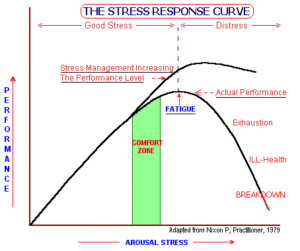
Photo Credit: patriziasoliani (Creative Commons)
A Nasty Strain of Stress Is Going Around
Lately, it seems like most people I know are really stressed out.
I’m completely overwhelmed. I want to hide under the covers and never come out.
I can’t turn my brain off at night, so I’m exhausted, which makes everything worse – and now I’m biting everyone’s heads off. Ugh.
I feel like I’ll have a nervous breakdown before this divorce is final.
The weekend sucked. I couldn’t enjoy it because I spent the whole time dealing with and stressing about work.
Oh man, have I been there. Many times. Just this past weekend, I got myself all worked up. It took me quite a while to realize that I could do something to change it – and I’m a stress management expert!
Stress can hijack your life, affecting all aspects of home, work, relationships, and play. It disrupts physical, mental, and emotional well-being.
Stress can suck the life force right out of you if you let it.
Don’t let it.
Time for Some Relief

Start your Stress Relief Toolbox, Photo Credit: MandeePhoto
If you’ve been feeling stressed lately, this series is for you. Over the coming weeks, I’ll teach you about stress and give you a whole toolbox full of mind-body techniques for managing stress so you can live better every day.
Some techniques are quick and can be done anywhere, any time. Others require a dedicated time and place. The good news is that you should feel some benefit immediately.
By making a concerted effort to regularly use these tools, you’ll change your brain, your body, your mind, and your outlook.
Learning to manage stress is the #1 thing you can do to live better. You read that right: it is THE most important thing you can do for your overall health.
Today’s post shows that stress isn’t ‘just in your head’ (although the process starts there) and provides the basic overview of stress and its effects. Once you understand the physiology, as well as your own individual stress reactions, later posts will provide the tools so that you can find what works best for you.
So let’s get started, shall we?
Stress Is Highly Individual

Photo Credit: The Art of Stress Free Living
Not all stress is bad. The Yerkes-Dodson Law empirically demonstrates that we need some stress for optimal performance. Like Goldilocks, the key is to stay in the ‘just right’ range, that zone where we achieve flow. Mihaly Csikszentmihalyi describes flow as being aroused and fully immersed in what we’re doing.
Too little arousal and we’re lolling about like sea lions.
Too much, and we’re angry, sick – or even dead.
What counts as optimal arousal differs by person and situation – it’s your appraisal that counts. What one person considers overwhelming, another may find fun or an exciting challenge – and vice versa. Whether you experience something as stressful also depends on your current resources – e.g., amount of sleep, hunger level, deadline immediacy, social support, noise levels, etc.
Defining stress and overwhelm is therefore completely personal. You determine when it feels like too much (although sometimes we do need others to point this out to us). You also decide what to do about it.
If a stressor is perceived as overwhelming, however, we all experience the same physiological response.
The Stress Response
Hans Selye first described this General Adaptation Syndrome in 1936, when he discovered a predictable set of physiological changes that occur once a threat is perceived: Alarm, Resistance, and either a Return to Baseline or Exhaustion.

Photo Credit: Lupien, et al (2009)
Alarm. When we perceive a threat, our amygdala (the emotion center) sounds an alarm to mobilize resources. It alerts the hypothalamus (command-and control), which communicates with the rest of the body via autonomic nervous system (ANS), so-called because it controls processes that happen automatically, like breathing, heart rate, and blood pressure.
The ANS has two parts: the sympathetic and the parasympathetic nervous system. The sympathetic nervous system is like a gas pedal in the car. It triggers the fight-or-flight response and revs up critical resources. The parasympathetic nervous system is the brake. It restores the system back to calm when danger passes.
After the amygdala sounds the alarm, the hypothalamic-pituitary-adrenal (HPA) axis moves into action, hitting the gas pedal that activates the sympathetic nervous system and starts a chemical cascade throughout the body. The hypothalamus signals the adrenal glands to start pumping epinephrine (adrenaline) through the body and releases corticotropin-releasing hormone (CRH) that travels to the pituitary gland, which releases adrenocorticotropic hormone (ACTH). ACTH causes the adrenal glands to release cortisol.
Cortisol increases blood pressure and blood sugar and suppresses the immune system. Glucose is rapidly produced for energy, adrenaline courses, and a whole host of physical changes immediately mobilize the body to fight or flee. This sudden surge has enabled people to lift cars off their children and outrun a saber-toothed tiger.
All of this happens so rapidly that we have little or no conscious awareness of it – the rest of the brain hasn’t even had time to process.
When the threat passes, the HPA axis takes its foot off gas, applies the brakes, and the system returns to baseline.
When the HPA-axis cannot overcome the stressor or when stressors recur often, the body enters the stage of resistance, where it adapts to the stress and continues to fight. If unresolved, the body may reach a stage of exhaustion, eventually resulting in death if not alleviated. (This is rare, however, as the human will to survive is quite strong, even under the most adversely stressful conditions.)
Modern-Day Stressors: Beyond the Saber-Toothed Tiger
This stress response system was perfectly designed thousands of years ago when life was radically simpler, and threats were nearly all of the physical survival kind. You saw the saber-toothed tiger, mobilized the stress response, and made it back to the cave for a relaxing dinner – living to pass on your genes to the next generation.

Photo Credit: Michael Loke (Creative Commons)
Flash-forward to the present day, however, and things get more complicated. While people still do face survival threats, we much more commonly have life circumstances that heighten arousal beyond our optimal range. Work pressure, marital difficulty, parenting, long commutes, chronic pain, and a million other things may be perceived as threatening. Furthermore, even our thoughts can send us careening over that arousal curve and into the stress response.
Because these threats are often ongoing, we’re more likely to spend a lot of time in Resistance, trying to adapt to the stressor as we work to eliminate it. Like lead-footed drivers, we rev the HPA-axis system continually, resulting in a period of chronic stress.
This is where things can go south in a lot of different ways – and why learning to prevent and manage stress is critical.
Chronic Stress Wreaks Havoc
Adrenaline and cortisol, while helpful in the short-term, act more like a toxin if they stick around. Sometimes people are unable to take their foot off this gas pedal on their own. When this happens, they can’t engage the relaxation response (of the parasympathetic nervous system) to bring them back to a normal state of arousal.
If not alleviated, staying in that state of resistance can lead to significant impairment across a wide range of functioning:

Photo Credit: KaitlynKalon (Creative Commons)
- Physical: Impaired immune functioning, chest pain, fatigue, headache, stomachache, muscle pain and tension, lowered sex drive, and sleep problems
- Emotional: Helplessness, overwhelm, mood swings, irritability, anger, restlessness, sadness, depression, frustration, and anxiety
- Cognitive: Inability to focus, impaired concentration, poor decision-making, and longer reaction times
- Behavioral: Substance abuse, over-/under-eating, anger outbursts, aggression, and social withdrawal
- Appearance: Skin problems, hair loss, dark eye circles, weight changes – stress isn’t pretty
Ongoing stress is a significant contributor to major health problems, including heart disease, high blood pressure, obesity, diabetes, and even death.
Moreover, our interpretation of stressors and of our coping ability has a huge effect on our experience. Beliefs, attitudes, and values not only help determine what we find stressful, they also affect how we cope. When stressors are viewed as insurmountable catastrophes and send people into victim mode, these negative outcomes are much more likely.
Take Charge and Stay Healthy

Photo Credit: anieto2k (Creative Commons)
Fortunately, research has identified many proven ways to prevent and manage stress so that it doesn’t lead to these negative outcomes. These techniques are effective with all types of people in many different situations. They include ways to improve physical, mental, emotional, and behavioral functioning so you can dramatically improve your health.
When I worked as a psychologist, my specialty was understanding and treating the effects of stress, particularly traumatic stress and posttraumatic stress disorder. If veterans who spent years in combat can benefit dramatically from these tools, you can, too.
Step 1: Get to Know Your Own Stress Response
For the next week, pay close attention to how you handle stress. In particular, note where you have difficulty in managing stress, as that will highlight areas most important for stress management focus.
The Stressors
- What situations do you find most stressful? What is it about them that causes this reaction?
- What other factors are more likely to cause stress? Pay attention to things like tiredness, hunger, space, noise, etc.
- How are you evaluating the situation? Notice what thoughts arise, how you’re appraising both the stressor and your ability to cope with it.
Physical Reactions
- Where do you typically experience stress in your body? Common areas include shoulders, neck, jaw, and abdomen. Where do you hold your stress?
- How is it expressed? Muscle tension? Aches? Stomachache or headache? Pain?
- What happens to your sleep? Appetite?
Cognitive Reactions
- What thoughts go through your mind when you’re stressed?
- What do you worry about?
- Notice what happens to your concentration, problem-solving, and decision-making skills.
- What attitudes and beliefs relate to this situation?
- What do you say to and about yourself?
Emotional Reactions
- How do you feel when you’re under stress? Are you more likely to get depressed? Angry? Something else?
- Do different types of stressors trigger different emotional reactions?
Behavioral Reactions
- What do you do differently when under stress?
- Note any changes in eating, exercise, and other activities
- Do you engage in any abusive behaviors, such as drinking, eating, or smoking too much or doing drugs?
- How do you react to others? Angry outbursts? Withdrawal? Abrupt or rude responses?

Photo Credit: focus2capture (Creative Commons)
Last, note the ways that you already effectively prevent and manage stress. It’s important to acknowledge your strengths, as you can easily build upon these to increase your range of coping responses.
Now, take a few deep breaths and find even five minutes to do something that brings you joy.
Next week, we’ll talk about effective ways to practice and introduce the most important, foundational tool in all of stress management.
To make this series as relevant and helpful as possible, I’d love to hear from you. What are your specific issues or questions related to stress, stress management, and preventing stress? Ask in the comments below – and be sure to sign up for my mailing list so you don’t miss a single post!


Very excited about the series! I’m constantly on the stress roller coaster and I know it. Lately, I’ve noticed a few things change in my stress response and how I’ve been managing it. The first place that it happens is right above one of my eyes, doesn’t matter which one. I feel it there and until I make myself present and breathe, does it go away. Migraines are a huge thing for me, something I had under wraps for years but for the past few months have been oh so present. I’ve made myself a promise: accept the stressors I thrive with and ease out the ones that serve me no good. Stay tuned 🙂
Hi there, Daisy – and thanks! You bring up a great point about accepting the stressors that help you thrive and easing out of the others. Sometimes we simply accept stressors as necessary without challenging whether or not they are. Is it true that someone has to run all the errands this morning? Is it true that you have to put up with a friend who drains your time and energy? For the ones that you do decide to deal with (and that may not feel like good ones), that same acceptance may be very adaptive. Resistance can cause more stress than the actual stressor! Rather, accepting that the deadline is very aggressive, for example, and then making a plan for how to meet it now and committing to look at how to prevent tight timelines in the future is far more helpful.
While I’m guessing it doesn’t feel good to have pain above your eyes, it is great that you’re able to make it go away by being present and breathing. Perhaps it’s possible to prevent that pain (at least some of the time) by implementing a more regular breathing and mindfulness practice. Also, are you aware of the types of situations (places, people, and activities that cause stress) and personal factors (your degree of hunger, fatigue, mood etc.) that lead to that pain? The more you know what leads to that pain, the better you’ll be able to make yourself present and breathe before the pain even happens (hopefully preventing it). When I’m hungry (I can get low blood sugar), I’m much more likely to feel overwhelmed, tense, and distracted in situations I otherwise would not. Since I started carrying snacks, I am much better at preventing these reactions. I feel physically better, and I’d bet that everyone around me feels better, too. 🙂
I loved the technical explanation of the physiological aspects of stress- it reminded me of my days in psychobiology during college.
I think what’s hardest for me is the low-grade, ongoing stress. It inhibits my ability to deal with things that are bigger stressors because I have less energy to cope with them. I do many different things to alleviate and reduce stress, but the constant traffic, worry about what’s for dinner, and not enough time get to me.
I know that I definitely hold a lot of stress in my jaw, and also in my neck/shoulders (not aided by sitting at a computer all day!). I’m also curious how stress and anxiety are connected. I’ve noticed that when I’m going through especially stressful times, I have more anxiety and am less able to control reactions to things that might ordinarily not be a big deal.
Hannah, you bring up all sorts of important issues here – thank you. Studies show that in the long run, having lots of daily hassles can be more detrimental on your overall health than major stressors or even traumatic events. Just as you say, it’s their constant nature that causes build-up.
I’ll be posting more about how to deal with stress of all kinds, but in the meantime, there are some things you can try. In traffic, for example, use the red lights of the traffic and brake lights as reminders to take some deep breaths – you’ll have plenty of reminders and may end up breathing diaphragmatically the entire drive! 🙂
With the worry and ‘not enough time’ thinking, a couple things come up. First, ask yourself if you can do anything about it right now. If you can, then act on it – you may write down or send yourself a voice memo with the dinner meal plan and shopping list, for example – and then focus on something else until you’re at the store or home actually preparing the meal. Often, when we worry, however, we are literally unable to do anything to change the actual situation we’re worrying about. It can help to recognize this and say to yourself “I can’t do anything about this now, so I’m going to focus on something else. I will focus on this when I can actually do something to productively change it.” Then redirect your attention to your breathing, sing a song in the car, or something else that distracts you.
With the ‘not enough time’ and other thinking like this, it may help to start by challenging whether that is even true. Often, we say we don’t have time, but we do. We may not have time to do it exactly how we envisioned it, but there’s almost always another way. Can you make something else for dinner? Eat leftovers? Enlist help in getting it ready – or delegate the entire preparation? Eat out? Drive a different way to get home? And it can help to coach yourself through these times, literally talking yourself through it by saying things like “I know I can get this done,” “I can find a way to do this,” and talking yourself through the steps that you’re doing to keep you in the here-and-now. Frequently, we feel anxious because we’re worry about the future (and we have absolutely no idea what will happen then, anyway), and we are not in the present. The present is the only time you can take effective action. The more you can redirect (by focusing on the breath, for example) your thinking to the present moment, the less you’ll get wrapped up in anxiety.
I hope some of this is helpful – and that you play around with some of the stress management techniques I’ll be sharing to see what works best for you. I’ll be curious to hear how it goes! 🙂
I’ve noticed this time of year causes a lot of stress for people too, as they are winding down and gearing up simultaneously. I love the questions. Getting really clear on your stress responses can be a game changer. I know when I start eating lots of chocolate it’s time to step back and take care!
I love the ‘chocolate barometer’! I can use that as well – although most prominent for me is clenching my jaw. Once, my nephew pointed it out saying “Auntie, the side of your face is really hard and moving!” Ouch – not very well-managed that day…
Time of year definitely has a huge influence, especially as we enter the holiday season. I have many clients that have difficulty at this time because they think they should be having a great and festive time, but they really feel stressed, overwhelmed, sad, etc. The question becomes “Knowing this can be a difficult time, how can I best take care of myself?”
Thanks for your comments, Melissa!
Loved the scientific explanation for stress’ effect on the body. I’ve been working on creating a life of peace over the last few years…which is not a life without stress…just better coping strategies. I am about to embark on another major life change and find myself experiencing a stress response before the stressor has occurred. Since I have some prep time (about 3 more weeks) I have been using this opportunity to practice some better self-talk, planning in advance for better efficiency, and getting ready to accept what comes my way. Kind of like labor practice before the actual birth!
Hi, CherylAnn – you bring up some great thoughts here. First, I love the reminder that a life of peace doesn’t mean you don’t have stress. Rather, it’s about how you deal with it. I think some people have the mistaken idea that a good or peaceful life means everything is calm. But that’s not the case, at least not for everyone. Addressing a challenge or change of some kind (like a move) is stressful but can contribute immensely to a meaningful life.
I also love your reminder that we can experience anticipatory stress. Sometimes, that stress response is worse than what happens in response to the actual event! Using it as an opportunity to plan is a great strategy, as then you’re using it to fuel adaptive coping, rather than feeding fear, uncertainty, or other unhelpful states. Thanks so much for your comments! 🙂
Very good article! You’re right, it’s very important to get in touch with where the stress is coming from and how it affects your body. I’ve been trying the EFT technique lately with amazing results. It feels really weird at first, but then I can literally feel the stress leaving my body with each breath.
Hi there, Nicole – I’ve used EFT as well and really get a lot from it, although I’m far from an expert. I think knowing what causes you stress and how to tell when you’re stressed (believe it or not, many people don’t really recognize that they’re under stress unless it’s major) helps you better prepare for those situations or avoid them – and also helps you start implementing a stress reduction strategy much sooner, when it’s most beneficial. Thanks for your comment! 🙂
I love that you broke down the Selye’s GAS.
I find myself constantly treating clients with adrenal fatigue as a result of longstanding stress. It’s an epidemic these days! I’m fascinated by how significantly stress impacts multiple body systems. It can seriously wreak havoc on our physical and emotional wellbeing.
It took me many years to understand that all of my bodily symptoms were related to my hyper-functioning nervous system and only when I nourished my adrenal glands with herbal medicine and learned techniques to ‘switch off’ was I able to restore balance.
Like you, stress is a passion of mine; I feel that it is the underlying factor for many of the health problems today. The problem is, many people (including myself for a while) don’t even realize it. Our bodies are resilient and it’s not until we restore that balance that we realize how much we were affected!
Erica, that is so true!! We can go a long time without realizing the damage we’re doing. I’m guilty of often going too fast and hard for way too long before I realize what I’ve done to myself. I definitely find that this is all a process, that I spiral into deeper learnings every time.
Do you have a recommendation of particular herbs or supplements for general adrenal maintenance? I’d like to know more about supporting my system from that perspective as well.
Thank you for your comments – your naturopathic perspective is a valuable treat! 🙂
Ah yes stress used to be a very good friend of mine, back in the day. These days I try not to let it get hold of me but somethings it can get pretty difficult. I love the techniques here will definitely pass them on and use them myself. Look forward to your other stuff coming up, all very interesting 🙂
Thanks, Paula – really appreciate that! Stress is such a challenge because we do run into life situations – often many – that are genuinely difficult, overwhelming, or feel like omnipresent hassles. The opportunity is to do as you say, not let it get hold of you – and to recognize when it does and find the most adaptive ways to cope.
I also find it curious how many people are almost proud of their stress level, as if it’s a measure of importance or justifies their position. I do remember having some times like that (probably when I was unhappy with my job or working in a place that didn’t feel supportive), but I think it’s something we need to stop as a culture. I may write something about this – it’s come up a few times lately as I’ve started this series.
Thanks again! 🙂